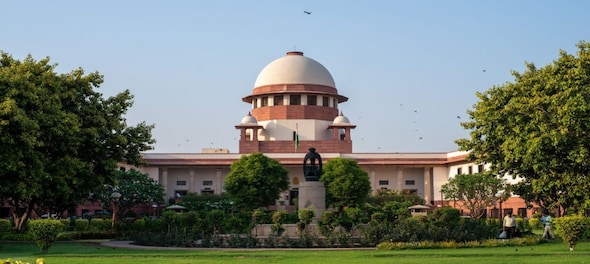
The Supreme Court, on Monday (November 6), declined to consider a request for the district-level establishment of a permanent expert group for the assessment of air pollution. Chief Justice DY Chandrachud-led bench declared the issue to be solely that of policy.
"Do you think pollution is going to end if we have committees all over districts across the country," the bench also comprising Justices JB Pardiwala and Manoj Misra said. When the bench expressed disinclination to entertain the matter, the counsel for the petitioner withdrew the PIL, and the matter was dismissed as withdrawn.
The top court was hearing a plea filed by one Ajay Narayanrao Gajbahar seeking directions for setting up a permanent expert committee at the district level for the assessment of pollution.
Tight restrictions, which included a ban on the entry of trucks that emit pollutants, were implemented in Delhi on Sunday, November 5, after the city's air quality fell into the "severe plus" category for the second time in three days as a result of unfavorable wind patterns and a major increase in field fires around northern India.
A toxic haze persisted over Delhi-NCR for the sixth consecutive day, obscuring landmarks from view and causing significant problems for people with existing respiratory issues.
The 24-hour average Air Quality Index (AQI), recorded at 4 pm every day, worsened from 415 on Saturday to 454 on Sunday, prompting the Centre to implement all emergency measures mandated under the final Stage IV of its air pollution control plan called the Graded Response Action Plan (GRAP).
GRAP categorises actions into four stages: Stage I - 'Poor' (AQI 201-300); Stage II - 'Very Poor' (AQI 301-400); Stage III - 'Severe' (AQI 401-450); and Stage IV - 'Severe Plus' (AQI >450).
Unfavourable meteorological conditions combined with vehicular emissions, paddy straw burning, firecrackers and other local pollution sources contribute to hazardous air quality levels in Delhi-NCR during the winter every year.
According to a Delhi Pollution Control Committee (DPCC) analysis, the capital experiences peak pollution from November 1 to November 15 when the number of stubble-burning incidents in Punjab and Haryana increase.
According to the New Delhi-based Indian Agricultural Research Institute (IARI), a total of 4,160 farm fires were reported from north India on Sunday — the highest so far this season.
(With inputs from PTI)
(Edited by : Priyanka Rathi)
Check out our in-depth Market Coverage, Business News & get real-time Stock Market Updates on CNBC-TV18. Also, Watch our channels CNBC-TV18, CNBC Awaaz and CNBC Bajar Live on-the-go!


Himachal Pradesh Lok Sabha elections: A look at key issues in the state
May 27, 2024 5:02 PM
Jammu and Kashmir witnesses highest poll participation in 35 years
May 27, 2024 3:03 PM
LIVE: INDIA bloc leaders likely to meet on June 1 to assess Lok Sabha poll performance
May 27, 2024 2:58 PM
Betting markets expect 310 seats for the BJP, says Raamdeo Agrawal
May 27, 2024 2:25 PM

